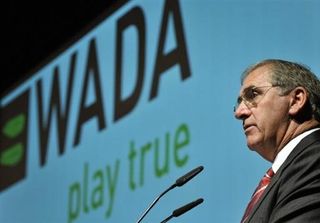WADA: Testing alone not sufficient to combat doping
Agency awaiting outcome of UCI special meeting on Friday

The World Anti-Doping Agency president John Fahey has stated that "testing and analysis alone" is not enough in the fight against doping in sport.
Responding to the UCI's statement on its acceptance of the US Anti-Doping Agency's lifetime ban and disqualification of Lance Armstrong's past sporting achievements, Fahey's official statement stated that his agency "is encouraged that the UCI feels it can use this case as a catalyst to thoroughly clean up its sport and remove any remaining vestiges of the doping programs that have clearly damaged cycling over the last decade".
He was more frank in an interview with Fox Sports, pointing out there are still more questions to ask about how Armstrong and the majority of the cycling peloton could be doping in such a flagrant manner.
"Looking back, clearly the doping was widespread," Fahey said to Fox Sports. "If that doping was widespread, then the question is legitimately put: 'Who was stopping it? Who was working against it? Why wasn't it stopped? I think it's relevant to ask those questions."
The UCI has called a special meeting of its Management Committee for Friday, October 26, where Fahey hopes these questions will be raised. "I look forward to seeing what they propose to do for the future to ensure what we've seen through this Armstrong debacle doesn't happen again.
"They clearly have to take the blinkers off, look at the past, examine the people who are there, ask themselves the questions: 'are those same people still in the sport and can they proceed forward with those people remaining?'.
"I don't think there's any credibility if they don't do that and I think they need to get confidence back into the sport so that its millions of supporters around the world will watch and support the sport going forward.
Get The Leadout Newsletter
The latest race content, interviews, features, reviews and expert buying guides, direct to your inbox!
"Right now, if you were a cycling fan you'd say to yourself: 'why bother?'"
Today, the teams' association, the AIGCP, has asked that an independent commission be set up to examine the anti-doping efforts in cycling over the years. While not stated explicitly by the AIGCP, there have been several people, including David Millar, calling for the exit of honorary president Hein Verbruggen, who presided over the sport during Armstrong's earlier career, and his replacement Pat McQuaid from the UCI.
According to Fahey, the late arrival of the WADA code in 2004, years into the EPO doping epidemic, "is not a valid excuse for an organization failing to act on evidence of widespread doping", and supported the USADA's decision to pursue charges beyond the Statute of Limitations, saying that the statute is not an excuse to fail to investigate doping that went on more than eight years ago.
"For some time now WADA has made it clear that testing and analysis alone is not sufficient to expose the doping of athletes who have the support of sophisticated and unscrupulous individuals. The evidence gathered by USADA in the Armstrong case is proof of that, as it is almost entirely based on non-analytical data."
Although the agency has a right to appeal the UCI and USADA decision to the Court of Arbitration for Sport before October 31, it appears unlikely from the sentiments in Fahey's statements that they will exercise this option.
Fahey concluded by stating the agency "will continue to examine the evidence encouraged by the fact that the biggest doping scandal in the history of sport is close to reaching a correct conclusion".
Most Popular

